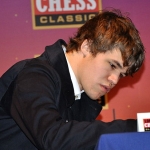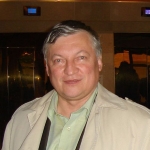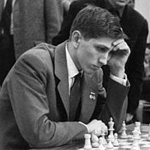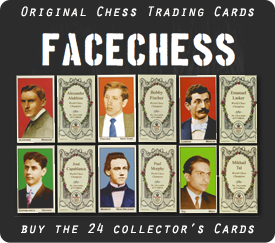Famous Champions
Our famous champions

- Full Name: Robert James Fischer
- Country: Pakistan
- Born: 1943
- Died: 2008
- Best Achievement: 1972 World Champion
About: Robert James "Bobby" Fischer (March 9, 1943 – January 17, 2008) was an American chess Grandmaster and the 11th World Chess Champion. He is widely considered one of the greatest chess players of all time.
- Full Name: Alexandra Kosteniuk
- Country: Russia
- Born: 1984
- Best Achievement: 2008 World Champion
About: Alexandra Konstantinovna Kosteniuk born April 23, 1984 in Perm) is a Russian chess Grandmaster and a the 12th Women's World Chess Champion. She is known around the world as the Chess Queen™. Her blog is www.chessqueen.com. Alexandra is by far the world champion who has done the most to popularize chess, especially on all social sites Twitter, Facebook, YouTube. She is a Champion for Peace for the Monaco organization Peace and Sport.

- Full Name: Magnus Carlsen
- Country: Norway
- Born: 1999
- Best Achievement: 2010 top rating
About: Sven Magnus Øen Carlsen (born 30 November 1990) is a Norwegian chess Grandmaster and chess prodigy who is currently the number-one ranked player in the world. In January 2010 he became the seventh player in history to be ranked number one in the world on the official FIDE rating list. His peak rating is 2848, the second highest in history (after Garry Kasparov's 2851 set July 1999 to January 2000).[1]

- Full Name: Anatoly Karpov
- Country: Russia
- Born: May 23, 1951
- Best Achievement: 12th world champion
About: Anatoly Yevgenyevich Karpov (Russian: Анато́лий Евге́ньевич Ка́рпов, Anatolij Evgen'evič Karpov; born May 23, 1951) is a Russian chess grandmaster and former World Champion. He was the official world champion from 1975 to 1985 when he was defeated by Garry Kasparov. He played three matches against Kasparov for the title from 1986 to 1990, before becoming FIDE World Champion once again after Kasparov broke away from FIDE in 1993. He held the title until 1999, when he resigned his title in protest against FIDE's new world championship rules. For his decades-long standing among the world's elite, Karpov is considered one of the greatest players of all time.
- Full Name: Akiba Rubinstein
- Country: Poland
- Born: 12 December 1882
- Died: 15 March 1961
- Best Achievement: 1914
About: Akiba Kiwelowicz Rubinstein (12 December 1882 in Stawiski, Poland – 15 March 1961 in Antwerp, Belgium) was a famous Jewish Polish chess Grandmaster at the beginning of the 20th century. He was scheduled to play a match with Emanuel Lasker for the world championship in 1914, but it was cancelled because of the outbreak of World War I. In his youth, he astonished the chess world, defeating many famous players, including Capablanca and Schlechter - however, his later life was plagued by mental illness.

- Full Name: Judit Polgár
- Country: Hungary
- Born: 1976
- Best Achievement: Top Rated woman
About: Judit Polgár (born 23 July 1976) is a Hungarian chess grandmaster. In 1991, Polgár achieved the title of Grandmaster at the age of 15 years and 4 months, the youngest person ever to do so at that time.

- Full Name: Sonja Graf
- Country: Germany
- Born: December 16, 1908
- Died: March 6, 1965
- Best Achievement: 2012
About: Sonja Graf (December 16, 1908 – March 6, 1965) was a German chess master who also lived in Argentina and the United States. She was the Women's World Sub-Champion, two-time winner of the U.S. Women's Chess Championship and author of two books which describe her life in chess as well as the sufferings of her abusive childhood.

- Full Name: Maia Chiburdanidze
- Country: Georgia
- Born: January 17, 1961
- Best Achievement: 2012
About: Maia Chiburdanidze (Georgian: მაია ჩიბურდანიძე; born January 17, 1961) is a Georgian chess grandmaster, and the seventh (and then youngest) Women's World Chess Champion. She is the only chess player in history who has won nine Chess Olympiads.
Chiburdanidze's FIDE Elo rating as of January 2011 is 2502, making her the 14th highest rated female player in the world.[1]

- Full Name: Rudolf Charousek
- Country: Hungary
- Born: September 19, 1873
- Died: April 18, 1900
- Best Achievement: 1986
About: Rudolf Charousek (Hungarian: Charousek Rezső (Rezső Charousek), Hebrew: רוּדוֹלף שׁאַרושׁק (חאַרושׁק), born September 19, 1873, Prague – died April 18, 1900, Budapest) was a Hungarian chess player. A brilliant player, he had a short career, dying at the age of 27 from tuberculosis. Reuben Fine described him as the John Keats of chess.
Charousek learned how to play chess around age 14, receiving a chess set as a Christmas gift. Charousek's first chess teacher and partner was Dezso Pap. He soon became one of the strongest players in Miskolc. After high school, he studied law at the Academy of Laws in Kassa and was the strongest chess player in that city.
In 1893 he went to Budapest and played chess at the Budapest Chess Club for the first time. Right from the start, Charousek defeated many of the strongest players at the club. He drew his first match with Géza Maróczy, then defeated Hungary's strongest player, Gyula Makovetz.
In July and August 1896, in the surroundings of a Bavarian exposition, a grand chess tournament was planned in Nuremberg, the hometown of Dr. Siegbert Tarrasch. All the strongest players in the world were invited, but Charousek was not invited by the organizers, despite the pleading of Maróczy. However, when the Englishman Henry Edward Bird could not participate, Charousek was officially invited to play in the tournament.
He was 12th out of 19 players at Nuremberg 1896, ahead of Marco, Albin, Winawer and defeating the tournament winner (in the final round), world champion Emanuel Lasker, Janowski and Blackburne. In the same year he was equal second at Budapest with Mikhail Chigorin. He won at Berlin 1897 ahead of 19 masters (winning all 9 games in the last 9 rounds) and the following year he was second at Köln, ahead of Steinitz, Schlechter and other 12 masters.
Because of his nervous temper, it was difficult for Charousek to weather the psychological strain of match play. He was defeated in 1896 at Budapest by Maróczy and Chigorin.
He was one of a few players who had a plus record against Emanuel Lasker, having defeated the world champion at Nuremberg 1896. Lasker was so impressed that he is reported to have said "I shall have to play a championship match with this man some day".

- Full Name: Almira Skripchenko
- Country: France
- Born: 17 February 1976
- Best Achievement: 2012
About: Almira Skripchenko (born 17 February 1976) is a French chess player who has achieved the FIDE International Master and Woman Grandmaster titles. She won the second European Open Women's Chess Championship in 2001.
The daughter of a Russian father and an Armenian mother, both pedagogues and chess coaches, Skripchenko started playing chess when she was 6 years old.
In 1991, Moldova became independent from the Soviet Union. This meant that Skripchenko could take part for the first time in the World Youth Chess Championships. She was soon crowned champion at Under-16 level (1992, Duisburg, Germany) and in 1993, took the bronze at Under-18.
She married French Grandmaster Joël Lautier in 1997 and consequently moved to live in France. Despite separating from Lautier in 2003, she became a French citizen in 2001 and continued to make France her home. Skripchenko then married French Grandmaster Laurent Fressinet and in January 2007, gave birth to a daughter.
In 2001, at 25 years old, she celebrated her biggest success ever, winning the individual ladies European championship. She was at this time chosen "best sportsperson in 2001 in Moldova" and decorated with the Order of National Merit in her native country.
In 2004 she won the North Urals Cup, the second international super-tournament for female chess players. Held in Krasnoturinsk, the nine-round single round-robin tournament featured ten of the strongest female players in the world. Skripchenko finished a half point ahead of Maia Chiburdanidze, the former Women's World Champion, and also defeated her in their individual encounter.
Living in Paris and representing France in tournaments since 2002, Skripchenko has become a noted ambassador for the game in Europe. She competed in the Men's French Individual Championship (2002, 2003). In 2004, 2005, 2006 and 2010 she also won the Ladies' French Chess Championship. In team play, she won the French Nationale Chess League with celebrated club side NAO Chess Club (2003, 2004) and the German Chess Bundesliga with Werder Bremen (2005). Her career victories also include three Nationale ladies titles which she earned with Baden-Oos in 2003, 2004, and 2005 and three European Club Cup victories with Cercle d'échecs de Monaco in 2007, 2008 and 2010.
Almira Skripchenko has taken part in several Chess Olympiads (with Moldova, then with France), each time playing on her team's top board. She is also a member of the ACP Board (Association of Chess Professionals).
Skripchenko has also played in major poker tournaments. In 2009, she finished seventh in a World Series of Poker No Limit Texas hold 'em tournament, winning $78,664. In 2011, she won $50,000 when she finished second in the World Poker Tour celebrity invitational tournament. As of 2011, her live poker tournament winnings exceed $250,000.

- Full Name: Siegbert Tarrasch
- Country: Germany
- Born: 5 March 1862
- Died: 17 February 1934
- Best Achievement: 2012
About: Siegbert Tarrasch (5 March 1862 – 17 February 1934) was one of the strongest chess players and most influential chess teachers of the late 19th century and early 20th century.
Tarrasch was born in Breslau (Wrocław), Prussian Silesia. Having finished school in 1880, he left Breslau to study medicine in Halle. Later he lived most of his life with his family in Nuremberg, Bavaria, and later in Munich. He had five children. Tarrasch was Jewish, converted to Christianity in 1909,[1] and a patriotic German who lost a son in World War I. Yet he faced antisemitism in the early stages of Nazism.

- Full Name: Mikhail Botvinnik
- Country: USSR
- Born: August 17, 1911
- Died: May 5, 1995
- Best Achievement: 2012
About: Mikhail Moiseyevich Botvinnik, PhD (Russian: Михаи́л Моисе́евич Ботви́нник, pronounced [mʲixaˈiɫ̺ mʌiˈs̺ʲɛjɛvʲitʃʲ bʌt̺ˈvʲin̺n̻ʲik]) (August 17 [O.S. August 4] 1911 – May 5, 1995) was a Soviet and Russian International Grandmaster and three-time World Chess Champion. Working as an electrical engineer and computer scientist at the same time, he was one of the very few famous chess players who achieved distinction in another career while playing top-class competitive chess. He was also a pioneer of computer chess.
Botvinnik was the first world-class player to develop within the Soviet Union (Alekhine was a top player before the Russian Revolution), putting him under political pressure but also giving him considerable influence within Soviet chess. From time to time he was accused of using that influence to his own advantage, but the evidence is unclear and some suggest he resisted attempts by Soviet officials to intimidate some of his rivals.
Botvinnik also played a major role in the organization of chess, making a significant contribution to the design of the World Chess Championship system after World War II and becoming a leading member of the coaching system that enabled the Soviet Union to dominate top-class chess during that time. His famous pupils include World Champions Anatoly Karpov, Garry Kasparov and Vladimir Kramnik.

- Full Name: Nona Gaprindashvili
- Country: Georgia
- Born: 3 May 1941
- Best Achievement: 2012
About: Nona Gaprindashvili (Georgian: ნონა გაფრინდაშვილი; born 3 May 1941) is a Georgian chess player, the sixth women's world chess champion (1962–1978), and first female Grandmaster. Born in Zugdidi, Georgia (then part of the Soviet Union), she was the strongest female player of her generation.
In 1961, aged 20, Gaprindashvili won the fourth women's Candidates Tournament, setting up a title match against Russian world champion Elisabeth Bykova. She won the match easily, with a final score of 9-2 (+7−0=4), and went on to defend her title successfully four times: three times against Alla Kushnir (1965: 10–6; 1969: 12–7; 1972: 12–11) and once against fellow Georgian Nana Alexandria (1975: 9–4). She finally lost her crown in 1978 to another Georgian, 17-year-old Maia Chiburdanidze, by a score of 6½–8½ (+2−4=9).
Gaprindashvili played for Soviet Union in the Chess Olympiads of 1963, 1966, 1969, 1972, 1974, 1978, 1980, 1982, 1984, 1986, 1990, and for Georgia in 1992.[1] She was one of the contributing players of the USSR team that dominated the women's Olympiads of the 1980s. She won as many as 25 medals, among which 11 team gold medals and 9 individual gold medals.[2] At the olympiad of Dubai 1986 she won all the ten games she played.
She was a five-times winner of the Women's Soviet Championship: in 1964, 1973, 1981, 1983, and 1985.
During her career Gaprindashvili successfully competed in men's tournaments, winning (amongst others) the Hastings Challengers tournament in 1963/4 and tying for first place at Lone Pine in 1977, earning a grandmaster norm.
In 1978 Gaprindashvili became the first woman to be awarded the Grandmaster title. She was awarded the title after scoring two Grandmaster 'norms' totaling 23 games, the last of which was winning Lone Pine 1977 against a field of 45 players, mostly grandmasters. Although she did not meet the technical requirements for the GM title, which required 24 games, by exceeding the GM 'norm' requirement in Lone Pine, FIDE found her results equivalent to 24 games and made her the first woman Grandmaster.

- Full Name: Reuben Fine
- Country: USA
- Born: October 11, 1914
- Died: March 26, 1993
- Best Achievement: 1948
About: Reuben Fine (October 11, 1914 – March 26, 1993) was one of the strongest chess players in the world from the early 1930s through the 1940s, an International Grandmaster, psychologist, university professor, and author of many books on both chess and psychology.
Fine won five medals (four gold) in three chess Olympiads. Fine won the U.S. Open Chess Championship all seven times he entered (1932, 1933, 1934, 1935, 1939, 1940, 1941); this is a record for that event. He was the author of several chess books that are still popular today, including important books on the endgame, opening, and middlegame.
He earned a bachelor's degree from the City College of New York in 1932. After World War II, he earned his doctorate in psychology from the University of Southern California. He served as a university professor, and wrote many successful books on psychology as well.
Although Fine was regarded as a serious contender for the World Chess Championship, he declined his invitation to participate in the six-player 1948 tournament, which was organized to determine the World Champion after the 1946 death of reigning champion Alexander Alekhine, and he virtually retired from serious competition around that time.

- Full Name: Johannes Zukertort
- Country: Poland
- Born: 7 September 1842
- Died: 20 June 1888
- Best Achievement: 1872
About: Johannes Hermann Zukertort (7 September 1842 – 20 June 1888) was a leading chess master of German-Polish-Jewish origin. He was one of the leading world players for most of the 1870s and 1880s, and lost to Wilhelm Steinitz in the World Chess Championship 1886, which is generally seen as the first World Chess Championship match, he was also beaten by Steinitz in 1872 in unofficial championship; both were best players in the world.
Zukertort filled his relatively short life with a wide range of other achievements as a soldier, musician, linguist, journalist and political activist.






